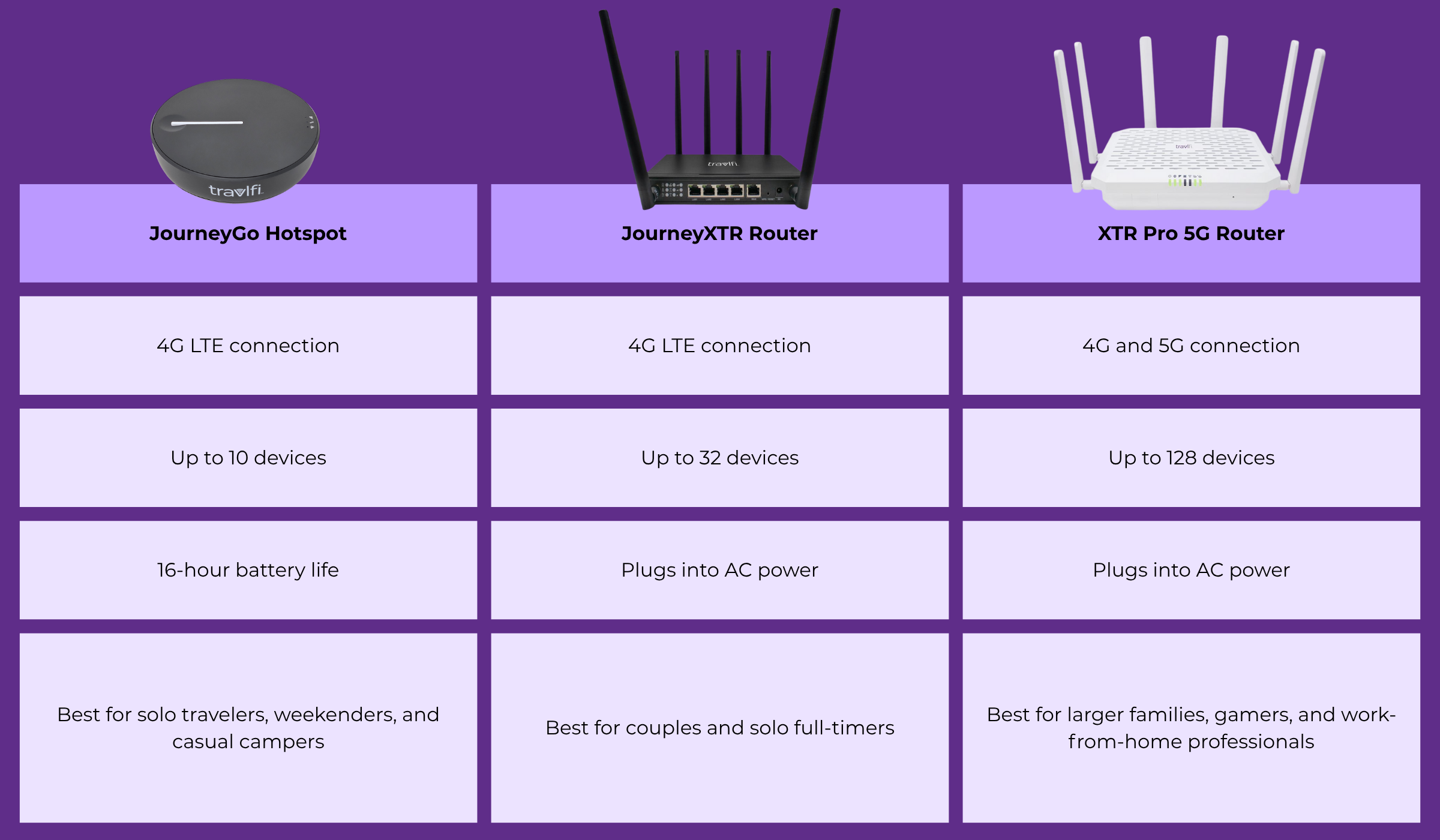
Cellular internet providers can distinguish between phone data and hotspot data—and that can be bad news for work and entertainment.
Imagine this: You’re set up at a stunning campsite, streaming your favorite show, getting some work done remotely, or attending an online class lecture, and your internet connection cuts out. Now, you’re stuck waiting for your streaming service to buffer, you just missed out on an important message from your boss, or you’re about to submit your class assignment but nothing is working—how frustrating is that?
In an era where connectivity is not just a convenience but a necessity, the right internet setup for your travel style is of undeniable importance. Much of the time, a phone hotspot just won’t cut it. We spoke with two connectivity experts to explain key differences between phone hotspots and dedicated mobile hotspots, and how that impacts your internet experience.
Experts Who Contributed to This Article
- This post was expert-reviewed by Jeff Gwinnell, connectivity expert at TravlFi.
- Jeff Gwinnell, connectivity specialist, and Nathan Popp, TravlFi Director of Operations, contributed expertise to this article.
Related: How to Work Remotely in an RV: Internet Setup, Job Ideas, and Productivity Tips
What You Should Know About Phone Hotspots
Phone hotspots, while functional, often have limitations in connection stability. Traditional hotspots that depend on one network provider may cause inconsistent performance. In areas with weak signals or network congestion, this can result in incredibly frustrating interruptions.
Plus, “cell phone services still prioritize voice over data,” Gwinnell says. “On the same cell plan, services such as phone data, SMS, hotspot and tethering can all be treated and priced differently.”
Gwinnell points out, too, that phone hotspot plans can be throttled with just regular use of streaming. “More often than not, data usage limits are met very quickly and result in heavy throttling- even with so-called unlimited plans,” he explains.
According to Popp, most consumer phone plans include restrictions on hotspot data, and many budget-friendly unlimited cell data plans don’t even offer hotspot capabilities. “Travelers often tell us that they have an unlimited data plan with their carrier, so they’ll just use their phone hotspot,” Popp says. “But what many people don’t realize is that carriers can differentiate between regular phone data usage and data used through a phone’s hotspot feature.”
“Even worse, these limitations could remain in effect until the next billing cycle,” Gwinnell says. “This is not ideal for full time travelers who need bandwidth to support daily use.”
With these types of restrictions in place, some people might find themselves constrained by contracts or plans that do not adapt to their changing connectivity requirements. This lack of flexibility can be frustrating, especially for those seeking tailored solutions that match their usage and travel schedules.
Related: TravlFi vs Starlink for RV Internet: Cost, Coverage & Speed—Which Fits Your Adventure?
Understanding the Benefits of Mobile Hotspots
Frees Up Your Phone
A mobile hotspot device will free up your phone’s internal resources and battery life, according to Gwinnell. “With a mobile hotspot, the device’s battery life is dedicated to keeping you connected,” he says—not doing all of the tasks your phone does, with connectivity on top. Plus, a dedicated WiFi device means you can easily make calls and use other functions on your phone while the mobile hotspot stays connected to a charger.
Supports More Connections
Mobile hotspots can support more users and devices than a typical cell phone’s hotspot function. “The mobile hotspot creates its own secure WiFi network and often has enhanced WiFi options built-in that are not always available in a typical cell phone hotspot,” Gwinnell explains.
Related: How Far Will 200 GB of Mobile Data Go? (Usage Guide for RVers and Remote Workers)
Provides Better Coverage
Compared to a cell phone, a mobile hotspot may include additional benefits such as increased WiFi network range, device tethering (without penalty), and doubling as a battery pack, Gwinnell says. Some mobile hotspots even provide an Ethernet port for wired devices.
Importantly, mobile hotspots with mobile hotspot plans are prioritized for data only, Gwinnell points out. “As such, mobile data plans are classed differently, with an emphasis on paying for and using large amounts of data. This is more ideal for a full time traveler that relies on email, video and streaming.”
Multi-carrier devices, like those that Travlfi offers, and data plans that are not tied to one specific network can further enhance connectivity options, he says. This is helpful in situations with areas that have better coverage with a specific provider or when congestion is a factor.
Affordable as a Second Device
“Unlike a modern-day smartphone, a mobile hotspot does not require high end hardware and software to fulfil its intended purpose,” Gwinnell says. “Thus, mobile hotspots are generally more affordable for the consumer as a secondary device. Mobile hotspots are usually priced to buy outright, at a fraction of the cost of a new smartphone, and do not necessitate a payment plan.”
Related: Unlimited Internet for RVs: Compare TravlFi, T-Mobile, Verizon, and More
FAQs
Is a hotspot safer to use than public WiFi?
There’s no argument about it: Using your own mobile hotspot is safer than using public WiFi, Gwinnell says. But don’t forget to change the default WiFi passwords of your mobile hotspot or phone hotspot. “Make sure to use a mix of numbers, letters and special characters for enhanced security,” Gwinnell says. “And never leave any WiFi network open or unsecured on your cellphone or mobile hotspot.”
How can I get a better signal on my hotspot?
According to connectivity specialist Jeff Gwinnell, you can improve hotspot signal by keeping your mobile hotspot in an accessible location with good ventilation and experimenting with placement around the vehicle or RV.
What’s better, a phone hotspot or mobile hotspot?
A dedicated mobile hotspot is always going to perform better than a phone hotspot, says connectivity specialist Jeff Gwinnell. This is because mobile hotspots are designed to be used for data only on a cellular network. They are made with one specific purpose in mind—create a private local network for sharing internet—whereas phones are multi-purpose and cell phone hotspot plans typically have the lowest network priority.
More Essential Reading for RVers:
- An RV Internet Expert Shares Tips for Optimal RV WiFi Setup
- TravlFi vs. Starlink: A Full-Time Vanlifer Compares Cost, Speeds, and Coverage
- The 4 RV WiFi Options Every Digital Nomad Needs to Know About
- Everything You Need to Know About RV WiFi Boosters
Learn more about how multi-carrier mobile hotspots and routers can help you work remotely from the road.
Which TravlFi Device Is Right for You?
TravlFi keeps you connected on the road. Not sure which device is best for you? Compare below.

Article By: Amanda Capritto
Amanda Capritto is a fitness and outdoors journalist who travels full-time in a Winnebago camper van. Her work has appeared in national and global outlets like Lonely Planet, Reader's Digest, CleverHiker, CNET, and more.

